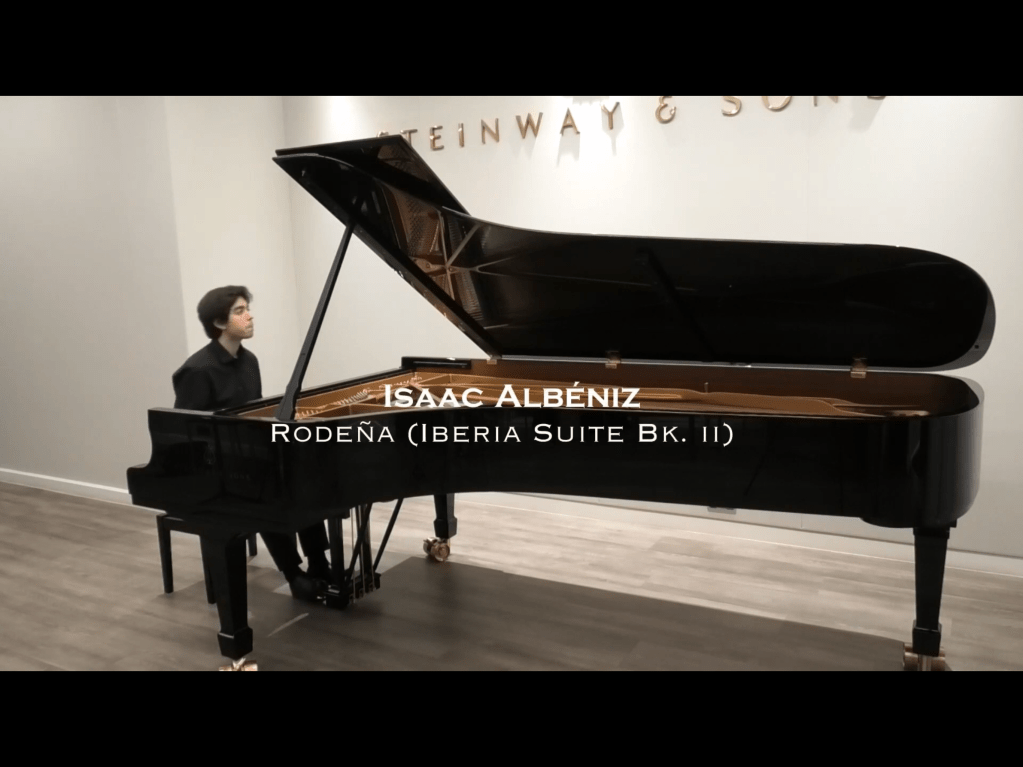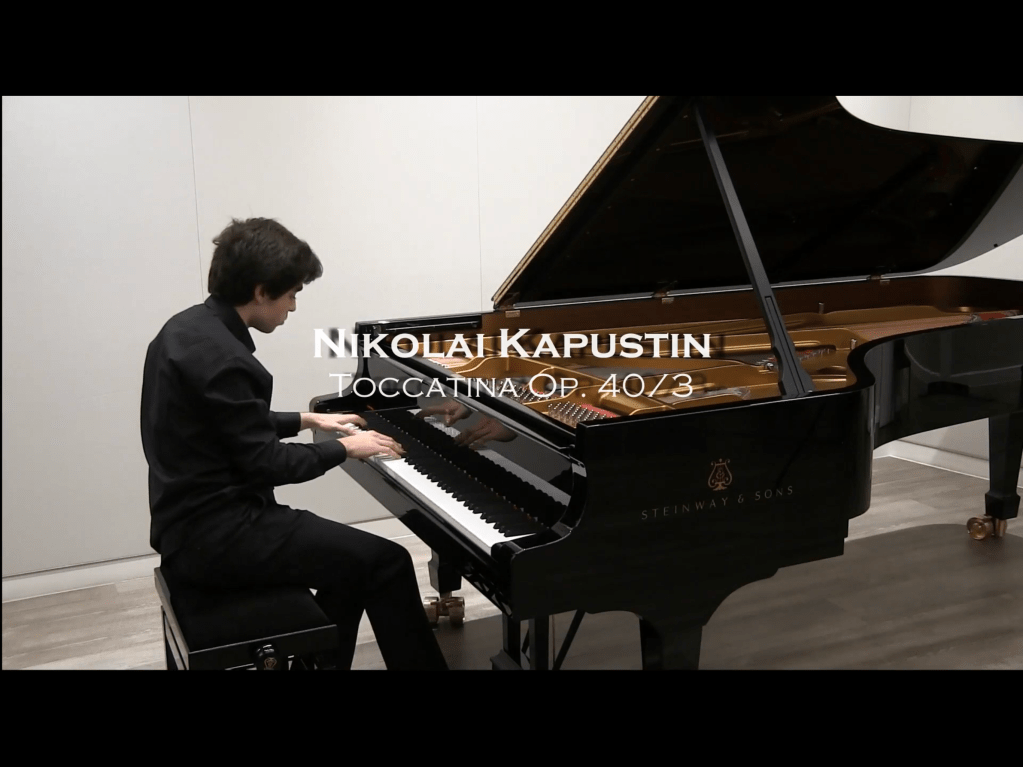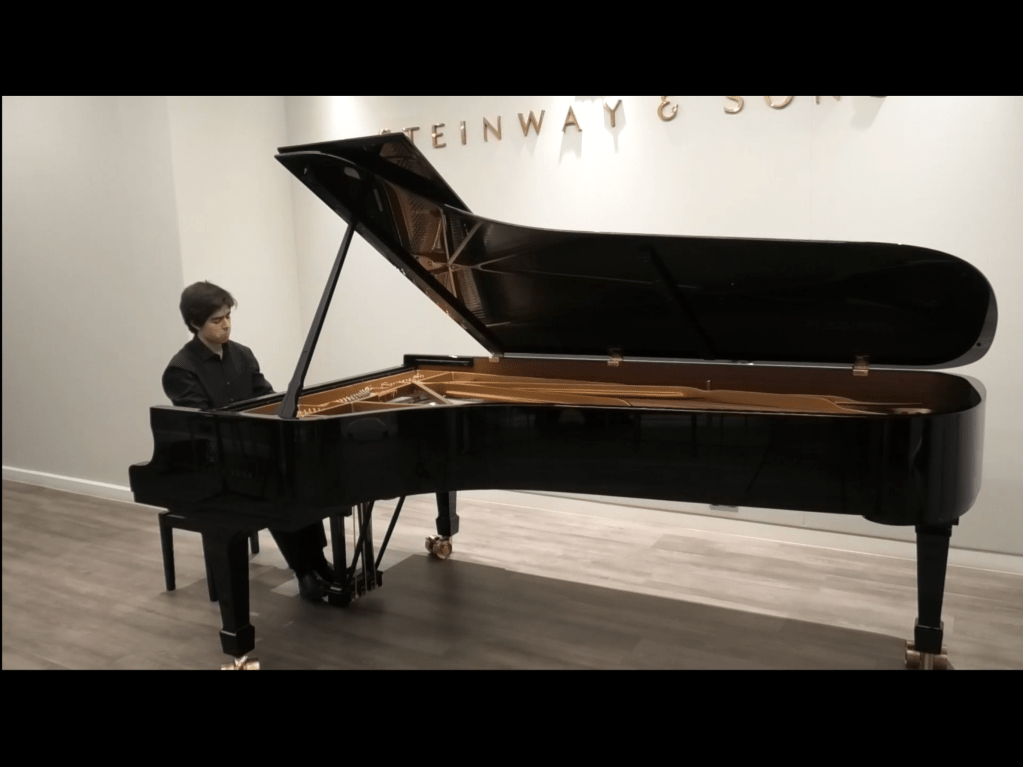The Keyboard Charitable Trust presents
Pedro López Salas – Livestreamed Recital
Wednesday 28 July, 7.00pm

Albéniz – Rondeña (Suite Iberia)
Scriabin – Four Preludes Op.22
Kapustin – Toccatina Op.40
Schumann – Kreisleriana
Ginastera – Sonata No. 1
Here are my first impressions that I shared with his mentor Norma Fisher immediately after the live recording …………’ Even in Ginastera,a piece of great effect,he brought his sense of colour and discovery to the first movement …the slow movement was even more remarkable for his control of sound. But in a great masterpiece like the Schumann I was completely mesmerised and thought of De Larrocha or Pires where the musical journey is so absorbing as every note has a meaning . My thought of slightly over phrasing in the second and third and counterpoints could verge on gimmick if taken a step further but his intelligence and musicianship never allow that.Maybe it was missing the sweep and abandonment which will come as he plays it more often.The last one was quite remarkable for its clarity and the added octave in the final passionate episode was judged as only a great artist could do.Just once but at that crucial moment like Rubinstein could do.
I will write more fully when it is streamed to the public but just wanted to thank you for all you are doing with these wonderful young artists.Sidney Harrison,’our piano daddy’,would be rubbing his nose in agreement and it is so important that we hear these young artists in masterworks and not just their party pieces of great effect.Pedro has both but it was the Schumann that marks him for me as a true artist and musician’
I was even more impressed by this recital on a second hearing.It was in fact Schumann’s Kreisleriana that stood out as a quite remarkable performance.It was Murray Perahia who had reduced some of the jury in Leeds to tears with his performance of Schumann’s Davidsbundler op 6 .It was remarkable for his absolute fidelity to the composer’s indications together with his sense of poetry and technical command which gave a simplicity and directness to everything he did.It was exactly this that Pedro brought to his performance of Kreisleriana.I was even more convinced on second hearing of the sweep and colour he did actually bring to all that he played but with such simplicity and subtle artistry.It is hardly surprising that he won the coveted Schumann prize at the RCM, bequeathed by that much missed critic Joan Chissell whose admiration for Artur Rubinstein knew no bounds.Her phrase that Mr Rubinstein,the Prince of Pianists ,turned baubles into gems was in itself an unforgettable turn of phrase.It was also exactly what Pedro did with Ginastera and Albeniz today as Rubinstein had done with Villa Lobos all those years ago.

Rondena is from Albeniz’s best-known work Iberia which was highly praised by Debussy and Messiaen who said: “Iberia is the wonder for the piano; it is perhaps on the highest place among the more brilliant pieces for the king of instruments”. As one critic put it ‘ there is really nothing in Isaac Albeniz’s Iberia that a good three-handed pianist could not master, given unlimited years of practice and permission to play at half tempo’.Rondeña is named after the Andalusian town of Ronda and is a variant of the fandango .It is from the second of the four books of twelve pieces that make up this suite and is full of subtle insinuating rhythms and energy.It was played with jewel like precision that did not preclude sultry atmosphere and passion.Pedro had a teasing rubato that was most beguiling and a sense of balance that created the magic world of Spain.The ecstatic duet between the hands was played with great poetry and artistry,a real tone poem of wondrous story telling and obviously only a dream as we were rudely awoken by the final scintillating bars.

The first four of Scriabin’s set of 24 Preludes op 22 were played with a great sense of colour with a very delicately shaped musical line full of luminous fluidity.There was a subtle sense of rubato and an understatement of sublime sensuality

Contrasting with the Kapustin Toccatina full of clarity and rhythmic precision with the jazz idioms brilliantly brought to life.There was a remarkable agility and relentless forward movement to the scintillating final bars.

Schumann Kreisleriana was given a remarkable performance of aristocratic simplicity from the very first notes with a melodic line of subtle shape and colour.A magic change of colour for the B flat section was played with great sensitivity and the subtle pointing of the left hand just before the return of the opening episode created a magic atmosphere of rare beauty.The second piece was played with a simplicity and aristocratic sense of line with some beautiful colouring from the left hand .I would have ignored the bar lines completely as his hesitations slightly disturbed the absolute simplicity that his subtle sense of legato was creating.There was a real sense of contrast with the Sehr lebhaft and it was so beautiful how he allowed the Etwas bewegte to just creep in with its romantic sweep and deep bass counterpoints.His remarkable sense of legato in the Langsamer return created a sense of improvised stillness to the magical ending.There was absolute clarity and nobility in the third piece contrasting with the sumptuous melodic line of the etwas langsamer which was of an almost whispered confession of great intimacy.Nobility was restored and turned into passionate frenzy beautifully controlled and sustained by the deep bass notes.There was beauty and simplicity in the fourth played with a beseeching calm and truly sublime sounds arriving at the bewegter that unfolded with an intensity that was very moving.The pianissimo just showed his searching musicianship so often overlooked but here scrupulously noted.Schumann’s dotted rhythms in the Sehr lebhaft were given a melodic shape with a sense of delicacy and colour that was remarkable.A song of heartfelt simplicity was followed by the frenzy and romantic fervour of the Sehr rasch.There was a very deliberate tempo to the last piece but he had a vision that was so clear and convincing for one of the most elusive of endings,There was great sweep and passion in the two intervening episodes where I have already spoken of the great effect of the added bass note before the absolute stillness and clarity of the long bass notes over which the staccato right hand disappeared into the distance.

Piano Sonata No. 1, Op. 22, is in four movements and Ginastera was commissioned by the Carnegie Institute and the Pennsylvania College for Women to write a piano sonata for the Pittsburgh International Contemporary Music Festival. The first performance in 1952 was given by pianist Johana Harris, wife of American composer Roy Harris, and Ginastera’s intention for the piece was to capture the spirit of Argentine folk music without relying on explicit quotations from existing folk songs.There was playing of rhythmic precision and driving Latin fever mixed with episodes of ravishing colour.The legato meanderings of the second movement were of Chopinesque mystery.There was startling intensity in the Adagio with its atmospheric calm and crystalline melodic interruptions and a final toccata played with great rhythmic fervour of great effect which brought this showcase recital to a brilliant conclusion .
‘Enormous confidence and great capacity of the young pianist to endow Liszt’s Piano Concerto No.2 with expressivity and poetry’ – El Correo de Sevilla. ‘Perfect blend of musicality, personality and brilliantly polished technique’ – La Tribuna. ‘Three encores, a standing audience and a long queue of spectators to congratulate the young Spanish pianist. Pedro López Salas brightened up the evening in Milan’ – Cultura di Milano. ‘More than an excellent pianist, he has the makings of a soloist and almost a conductor, judging by his stage performance’ – Ritmo Magazine
Pedro López Salas was born in 1997 in Spain. He is currently studying with Norma Fisher at the Royal College of Music on a full Leverhulme Arts Scholarship. He has recently completed his studies with Professor Mariana Gurkova at the CSKG (Centro Superior Katarina Gurska) in Madrid, receiving an Honours Degree in piano, an Extraordinary National Education Award and an Exemplary and Academic Merit Award from the Rotary Club. López Salas has won numerous prizes in national and international competitions, including First Prizes in the following international piano competitions: Malta; Compositores de España CIPCE; Madrid; ‘César Franck’, Brussels; ‘Ciudad de Leganés’; Granada’s ‘María Herrero’; Villa de Xábia; International Music Competition of Panticosa ‘FIP’; Wiener Klassiker in Hungary, Franz Liszt Center in Spain and the ‘Iscart’ Lugano International Music Competition in Switzerland, among others. He has recently received an invitation to participate in the prestigious International Piano Competition ‘Vendome Prize’ in New York which will take place in October 2021. López Salas has participated in masterclasses with such internationally renowned pianists as Dimitri Baskirov, Dmitri Alexeev, Alexander Kobrin, Pavel Nerssesian, Pascal Nemirovsky, Pavel Gililov and Ludmil Angelov. He has also studied on piano performance courses in Austria, Germany, Malta and Italy. He has performed all over Spain and Europe in auditoriums such as the Manuel de Falla in Granada, the Teatro Circo in Albacete, the Aachen Theatre, the Wiener Saal in Salzburg and as a soloist with the Valencia Orchestra (OV) in the Palau de la Música in Valencia and with the Real Orquesta Sinfónica de Sevilla (ROSS) in the Teatro de la Maestranza in Seville. He has performed with the Orquesta Sinfónica de Castilla y León and with the GSKG Orchestra in performances of concertos by Chopin and Liszt. He also performed Rhapsody in Blue by Gershwin in the ADDA in Alicante and the Auditorio Internacional de Torrevieja with the OST (Orquesta Sinfónica de Torrevieja).
Here is your free link to watch the concert, which comes from the Steinway Hall, London:

Immediately followed by an interview with co-artistic director, Dr Elena Vorotko, talking about Pedro’s life and his choice of music.
The Keyboard Trust is entirely dependent on donations from our friends for its work in supporting outstandingly talented young musicians and so we’d be especially grateful to you for your support of this venture.Please feel free to make a donation via this website.
https://cafdonate.cafonline.org/4535#!/DonationDetails
Any contributions will go towards creating new performing opportunities for these remarkable young musicians at the start of their careers,
Thank you and best wishes from The Keyboard Trust for Young Professional Performers
30th Anniversary Year
Patron: Sir Antonio Pappano

Una risposta a "Pedro Lòpez Salas – artist and musician"